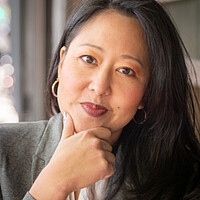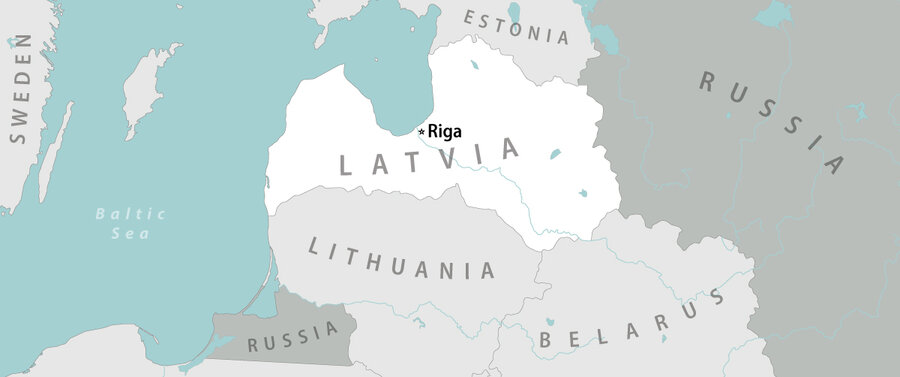Who’s a Latvian and why? A complex question just got harder.
Loading...
| Riga, Latvia
Since Latvia declared independence from the Soviet Union in 1990, its citizens – a quarter of whom are ethnic Russians – have been wrestling to define their identities.
As they distanced themselves from memories of Soviet occupation, the puzzle seemed to be growing less fraught. But Moscow’s invasion of Ukraine has brought old divisions to the surface.
Why We Wrote This
A story focused onLatvia had been making progress toward the inclusion of its ethnic Russian citizens. But the war in Ukraine has frozen such movement as the government raises its guard against neighboring Russia.
The government is cracking down on the small minority of ethnic Russians who support President Vladimir Putin, and just when dialogue would seem more important than ever, people have largely “closed all the windows and switched off the lights” on discussion of the identity issue, says Deniss Hanovs, a professor of cultural history.
Russian Latvians may not be numerous, but they wield potential influence. Most of them are neutral on the Ukraine war, or support Kyiv, but others could cause trouble, officials fear.
One focus of discord was the Victory Memorial in the capital, Riga, commemorating the Soviet soldiers who died freeing Latvia from the Nazis. But most Latvians remember better the Soviets’ own 50-year occupation of their land. Last week the authorities toppled the monument, calling it a catalyst for polarization.
“To have a strong society ... you should have a common history,” says pollster Arnis Kaktins. “We don’t have that.”
The nature of Alice Zvezda’s identity is as challenging to juggle as the infant she’s pushing around a Riga park.
“My husband is Latvian and I am Russian. So I am like, both. I feel myself both,” says Ms. Zvezda as she rocks her baby stroller cradling a next-generation Russian Latvian.
That kind of dual identity had been growing easier to navigate as Latvians distanced themselves from memories of their country’s 50-year occupation by the Soviet Union that ended in the early 1990s.
Why We Wrote This
A story focused onLatvia had been making progress toward the inclusion of its ethnic Russian citizens. But the war in Ukraine has frozen such movement as the government raises its guard against neighboring Russia.
But it suddenly got harder last February, when Russia invaded Ukraine and the Latvian government began arming itself with words and weapons: It is reinstituting the military draft, excising Russian language from public schools, banning Russian state media from the airwaves, and dismantling Soviet-era memorials.
The vast majority of Latvians — including a quarter of the country’s Russian speakers —are solidly against the war in Ukraine, but a small and significant segment of the Russian diaspora sympathizes with Russian President Vladimir Putin. Once tolerant of such citizens, the Latvian government is now trying to crack down on their way of thinking, just when Latvian society was making some progress toward inclusion of its multitude of ethnic identities.
It would seem that dialogue over Latvian identity, a complex construct of language, culture, and nationality, is needed more than ever. But since the war began, people have largely “closed all the windows and switched off the lights” on discussion, says Deniss Hanovs, a Russian Latvian cultural history professor at Riga Stradiņš University.
“The history of Latvia has been so very bloody and full of conflict and tragedy that most people stick to ethnic identity” when they define themselves, says Dr. Hanovs. “But we need to go beyond ethnic identity. One needs to be a citizen. The notion of [a] political nation is the only future for a multiethnic culture in Europe.”
A complicated dance
But that’s a complicated dance today for a society that’s roughly a quarter ethnic Russian. “The younger generation [of ethnic Russians and Latvians] is making families together and we do not have conflict,” explains Ms. Zvezda. “We were hoping when the generations change and the politicians are our age, it will be totally fine – love and understanding. But no, now war came. And it’s splitting the community.”
About 150,000 Russian-speaking Latvians sympathize with Russia on the war, polls have found. “That’s a lot for small Latvia,” says Ieva Bērziņa, a researcher on Russian strategy at the National Defense Academy of Latvia.
And it leaves open the possibility that the Kremlin might destabilize Latvia using the Russian diaspora. Reaching out to this population through a common language, religion, and historical memory offers Russia an “unparalleled soft power influence to further foreign policies abroad,” in the words of a 2021 report by researchers at the London School of Economics.
Dr. Bērziņa found in a 2016 study that Russian influence in Latvia could be “quite huge ... when it comes to war and real-life situations that can catalyze differences within society,” she says. “When it goes out onto the street it’s a huge problem.”
One of those potential catalysts was the Victory Memorial in Riga, where ethnic Russians congregated every May 9 to celebrate the Soviet Army’s victory over Nazi Germany. (The Soviets liberated Latvia from the Germans but ushered in their own five-decade-long occupation of the country.)
The authorities last week toppled the main obelisk, saying it risked “polarizing society,” and removed other structures from the memorial complex, in line with the wishes of roughly 75% of Latvian speakers, but against those of the same proportion of Russian speakers, according to a poll by the Latvian polling firm SKDS. It’s a stark divide.
“The monument means different things for Latvians and Russians,” explains Dr. Bērziņa. “For Latvians it’s a symbol of [Soviet] occupation and pain, and for Russian speakers it’s primarily a commemoration of their ancestors who fought against Nazi Germany.”
This lack of a shared understanding of history hinders progress toward a harmonious Latvian society, says pollster Arnis Kaktins, SKDS’s executive director.
“To have a strong society, one of the pillars is that you should have a common history, and we don’t have that,” he says. “We have two different histories regarding the Second World War – with different beliefs around whether Russia occupied us, or whether they liberated us from the evil fascists.”
Using Pushkin as a weapon
But minds are changing, nonetheless. Half of Russian speakers tell pollsters they sympathize with neither Russia nor Ukraine in the war. This group appears to be in transition away from traditional loyalties, says Mr. Kaktins.
“They are confused; they are shocked; they need more time to talk, to understand, and to process what’s actually happening,” he says. “If suddenly something happens which contradicts your worldview of Russia as beautiful and good, you don’t automatically change it in two hours. It is a very slow, gradual process. It takes a long time.”
Until the Ukraine war began, adds Dr. Hanovs, the Russian Latvian cultural history professor, ethnic Russians had seen their former homeland’s history in a heroic light, symbolized by musicians and poets such as Peter Tchaikovsky and Aleksandr Pushkin. They never associated their culture with evil.
“Now, starting from February, this is part of my own [Russian] identity,” Dr. Hanovs says, explaining that President Putin invaded Ukraine in the name of Russia’s glorious past. “It’s not only Tchaikovsky and Pushkin, but also ‘Pushkin can be used to kill people in Ukraine,’” he says.
Latvia’s defense minister, Artis Pabriks, is losing patience. He is in charge of reinstituting military conscription by 2023, and he insists that Putin supporters must understand that the glory days of the Soviet Union are over.
“How can you tolerate in your country people who are saying, ‘We’re against Parliament and against democracy and against freedom’?” asks Mr. Pabriks during an interview in Riga. “We cannot simply say, ‘Oh yes, you are against an independent Latvia but you’re welcome to walk around.’”
That hardening attitude indicates how difficult it could be to integrate Latvia without alienating those on the fringes, and without suppressing Russian culture and language.
The sizable group of Russian speakers who declare themselves patriotic citizens of Latvia might show the way, if the government takes a nuanced approach.
“I hope the Latvian political elite will manage to differentiate between those who are part of Latvia and those who still exist in the past,” Dr. Hanovs says. And some observers believe that the war might actually speed up convergence on a national Latvian identity, as Russians are forced to confront hard facts about their former motherland.
Ms. Zvezda, the young Russian Latvian mother living in Riga, harbors more modest hopes – that the growing difficulties of everyday life will push larger questions of war and peace and ethnic identity aside.
“War is very, very bad,” she says. “But it seems we are not speaking about these things anymore because we have corona, and prices are rising. We are afraid for our future.”
Editor’s note: This story has been updated to clarify Deniss Hanovs as the source of a quote.










